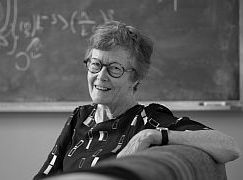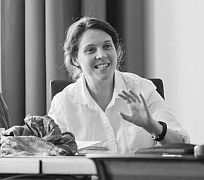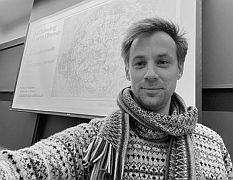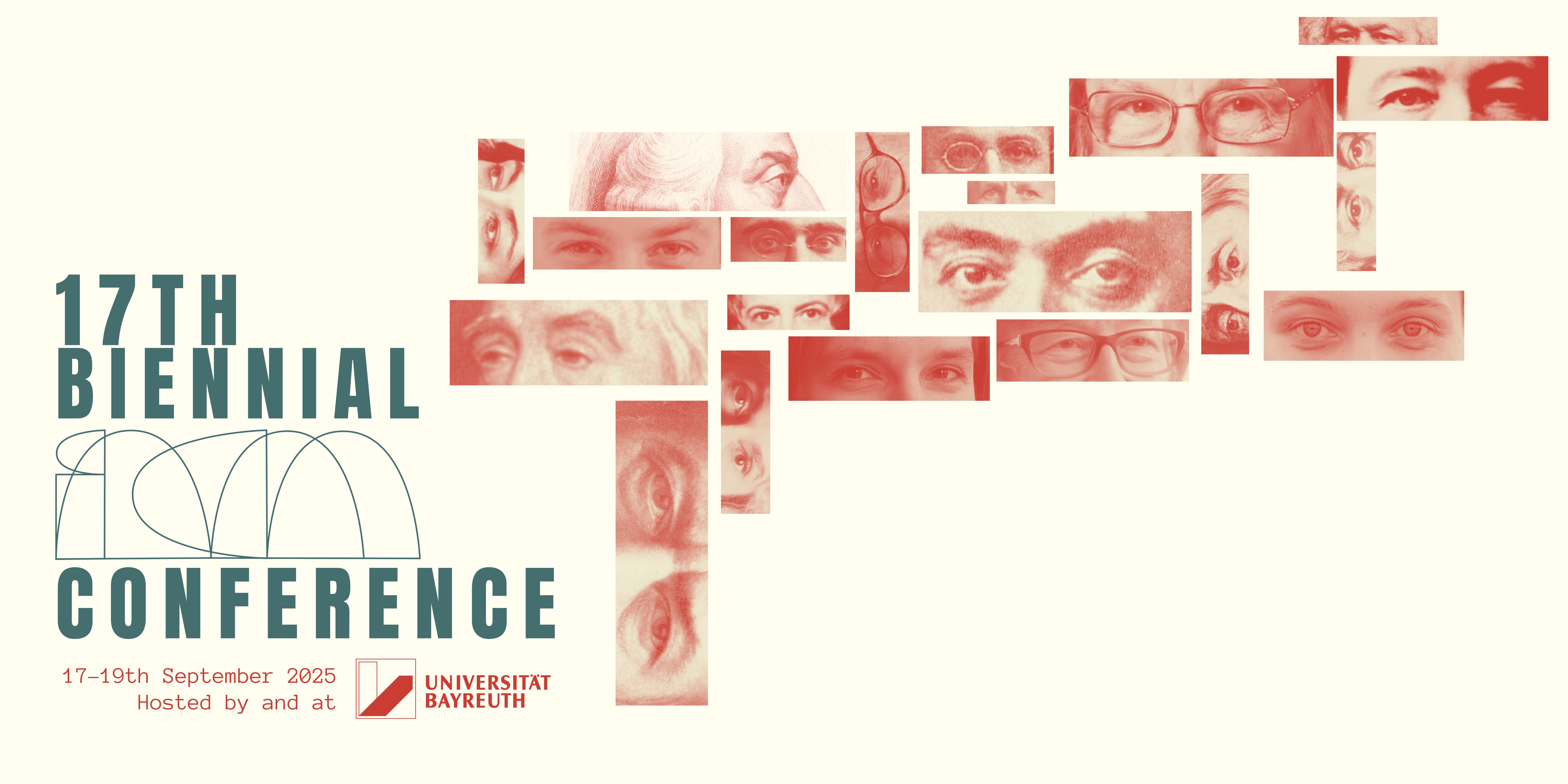17th Biennial INEM Conference
Welcome!
We are delighted to host the 17th Biennial INEM Conference taking place September 17th-19th, 2025, with support by the International Network for Economic Method (INEM).
Latest additions:
- Book of Abstracts
- Final programme
- Event I: City Tour Meeting Point: Richard Wagner Museum, Richard-Wagner-Straße 48, BayreuthDate: 17.09.2025 (Wednesday)Time: 17:00 - 19:00
- Event II: Young Scholars EventMeeting Point: Bottles - Sophienstraße 4, BayreuthDate 17.09.2025 (Wednesday)Time: 20:00 - late
Key information at a glance:
- Submission deadline: March 1st, 2025
- Registration deadline: August 31st, 2025 (registration page)
- Keynotes: Wendy Carlin, Katherine Furman, and Richard Pettigrew
- Programme
- Featuring a young scholars award and travel grants, a social programme, free childcare, a remote presentation option and the opportunity to submit to a special issue of the Journal of Economic Methodology.
Page Menu:
Call for Submissions
We welcome proposals for contributed papers and symposia in all areas of the philosophy and methodology of economics. We particularly encourage submissions that combine philosophy and methodology of economics with other perspectives on studying economics offered, for instance, by history and sociology of economics, decision theory, ethics and political philosophy, as well as submissions in Africana philosophy and economics, social ontology, feminist approaches and postcolonial approaches. Contributions by early career scholars and from outside Western Europe or the US/Canada are particularly encouraged. A limited number of remote presentations can be accommodated. Speakers at the conference will be eligible to submit their full papers to a special issue of the Journal of Economic Methodology.
Submission Procedure:
Please prepare your submission for anonymous review, and submit it through https://inem2025.sciencesconf.org. Abstracts for contributed papers should be 700–1,000 words. If you are interested in presenting your paper remotely, please indicate so in your submission. A symposium is typically composed of 3 or 4 papers that address a shared theme within a 1,5 hour time slot. Symposium proposals should contain a short summary of the topic and motivation of the symposium (250–300 words) accompanied by abstracts of the symposium papers (500–900 words each). Book symposiums or proposals for alternative formats will also be considered.
Deadlines:
- March 1st, 2025: Deadline for the submissions of both papers and symposia.
- May 1st, 2025: Communication of decisions.
- August 31st, 2025: Conference registration deadline.
Organisers
Programme Committee:
Catherine Herfeld (Co-Chair); Guilhem Lecouteux (Co-Chair); Erik Angner; Antoinette Baujard; Constanze Binder; Ivan Boldyrev; Merve Burnazoglu; François Claveau; Maxime Desmarais-Tremblay; Malte Dold; Sheila Dow; Judith Favereau; Francesco Guala; Conrad Heilmann; Sahar Heydari Fard; Kevin Hoover; Chiara Lisciandra; Caterina Marchionni; Mary Morgan; Ivan Moscati; Patricia Rich; Don Ross; David Teira
Local Organising Committee:
Johanna Thoma (Chair); Patricia Rich (Deputy Chair); Katja Kaufmann; Stefan Napel; Olivier Roy; Frank Steffen
Contact information:
Programme Committee: inem2025@sciencesconf.org
Local Organisers: Monika.Schecklmann@uni-bayreuth.de
Opportunities for Young Scholars
The Journal of Economic Methodology is kindly sponsoring both a young scholars award, as well as travel grants for young scholars. Young scholars are either graduate students or scholars who have obtained their PhD after January 1, 2022. The young scholars award will be awarded to the best papers presented at the conference by young scholars. Up to three papers will be selected by a committee consisting of INEM scholars. Each will be awarded USD 750. After communication of acceptance, young scholars accepted at the conference are also eligible to apply for travel support for any costs not covered by their institutions. Young scholars who submit abstracts for INEM 2025 should indicate their status as such during the submission process.
Registration
A registration page has been set up here: https://www.eventbrite.com/e/17th-biennial-inem-conference-tickets-1556728269159?aff=oddtdtcreator. Here you can also indicate whether you wish to join for the conference dinner, and whether you require childcare, which is provided free of charge for the duration of the academic parts of the conference (but not for the evening programme or Saturday hike).
Fees:
We expect all participants to become an INEM member here starting at USD 30 (reduced fee)/USD 40.
- Reduced conference fees INEM members: EUR 55
- Reduced conference fees non-INEM members: EUR 95
- Regular conference fees INEM members: EUR 105
- Regular conference fees non-INEM members: EUR 165
Reduced fees apply to young scholars (graduate students or scholars who have obtained their PhD after January 1, 2022) and those from non-high-income countries (according to the World Bank’s classification). The fees cover all lunches, coffee breaks and a social programme. For the INEM-sponsored conference dinner, a partial contribution of EUR 40 will be charged at the venue.
Schedule
The full programme can be found here.
Wednesday, September 17th:
- 08:30-09:30: Registration
- 09:30-09:45: Welcome
- 09:45-11:00: Keynote 1: Richard Pettigrew
- 11:00-11:30: Coffee Break
- 11:30-13:00: Parallel Sessions A
- 13:00-14:30: Lunch and Journal of Economic Methodology Meeting
- 14:30-16:00: Parallel Sessions B
- 16:00-16:30: Coffee Break
- 17:00-19:00: City Tour
- 20:00-late: Young Scholars Event
Thursday, September 18th:
- 08:30-09:30: Registration
- 09:30-11:00: Parallel Sessions C
- 11:00-11:30: Coffee Break
- 11:30-13:00: Parallel Sessions D
- 13:00-14:30: Lunch
- 14:30-16:00: Parallel Sessions E
- 16:00-16:30: Coffee Break
- 16:30-17:45: Keynote 2: Wendy Carlin
- 18:30-19:30: Brewery/Catacombs Tours
- 19:30-late: Conference Dinner
Friday, September 19th:
- 08:30-09:30: Registration
- 09:30-11:00: Parallel Sessions F
- 11:00-11:30: Coffee Break
- 11:30-13:00: Parallel Sessions G
- 13:00-14:00: Lunch
- 14:00-14:45: INEM Plenary
- 14:45-16:00: Keynote 3: Katherine Furman
- 16:00-16:30: Coffee and Farewell
Saturday, September 20th:
From 10:30: Anybody still around is welcome to join for a leisurely hike to a countryside Biergarten for lunch. You should be able to get back to the train station by 14:30.
Keynotes

Wendy Carlin
Wendy Carlin is Professor of Economics at University College London (UCL), Research Fellow of the Centre for Economic Policy Research, and external professor at the Santa Fe Institute. She leads an international project - the CORE Econ project - to reform the undergraduate economics curriculum and is co-director of the James M. and Cathleen D. Stone Centre on Wealth Concentration, Inequality and the Economy. Her research focuses on macroeconomics, institutions and economic performance, the economics of transition, and economic knowledge and education. She has co-authored with David Soskice four macroeconomics books, the most recent of which, Macroeconomics: Institutions, Instability, and Inequality (2024) brings to the fore how inequality can be incorporated in macroeconomic modelling of business cycles, financial instability, and growth in a unified way.

Katherine Furman
Katherine Furman is a South African philosopher working at the University of Liverpool. Previously, she was the director of the MA in Health and Society at the University College Cork, Ireland. She works on philosophy and public policy, specialising in health policy cases, particularly infectious diseases in African countries, mostly HIV/AIDS and Ebola. She is concerned with health policy interventions in contexts of deep distrust, especially when that distrust is warranted, and the stakes of intervention are high. She holds a PhD in Philosophy from the London School of Economics, where she worked on the South African AIDS denialist policies of the late 1990s and early 2000s.

Richard Pettigrew
Richard Pettigrew is Professor of Philosophy at the University of Bristol. He received his PhD in Mathematical Logic from the University of Bristol in 2008. He initially worked in the philosophy of mathematics, then Bayesian epistemology and the foundations of statistics, and then rational choice theory; more recently, he has begun to write in ethics and political philosophy with a particular focus on the overlap with epistemology and rational choice theory. He has published three research monographs (Accuracy and the Laws of Credence (2016), Choosing for Changing Selves (2019), and Epistemic Risk and the Demands of Rationality (2022)), one co-authored trade book (Who Are Universities For? (2018)), and one expository book (Dutch Book Arguments (2020)). During 2024-25, he will be the John Locke Lecturer at the University of Oxford.
Logistics
Location:
The conference will take place in the RW building on the main campus of the University of Bayreuth. You can find a campus map here: https://www.uni-bayreuth.de/en/campus-map The campus is about a 30 minute walk from the centre of Bayreuth. There are also very regular buses from the centre and from the train station to campus (get off at stops “Mensa” or “Zentrale Universitätsverwaltung”). As well as all common route mapping apps, you can use this website to find connections: https://www.stadtwerke-bayreuth.de/bus-parken/fahrplanauskunft. It is easiest to pay for your ticket in cash on the bus.
Getting to Bayreuth:
There are three main ways to get to Bayreuth.
- By train: Bayreuth does not have a long-distance train connection, but there are regular regional trains from Nuremberg and Bamberg to Bayreuth. The regional train from Nuremberg to Bayreuth takes about an hour. From Bamberg it takes about one hour and thirty minutes. When boarding the train from either Nuremberg or Bamberg, it is important to make sure you are sitting in the right section. This is because many of the trains are coupled with only one section going to Bayreuth. So make sure that the section of the train you are in is labelled ‘Bayreuth’ or ask someone for help. The train station in Bayreuth is called 'Bayreuth Hauptbahnhof'. You can find tickets and further information here on the Deutsche Bahn website.
- By car: If you are travelling by car, it is very easy to get to Bayreuth. The university campus is located near the A9 motorway exit Bayreuth-Süd. There are plenty of free parking spaces on campus. The hotels listed below all have their own car parks, although there is a small charge for parking.
- By plane: For those travelling by plane, if there is a suitable connection, Nuremberg airport is a very convenient option. From there, take the underground to Nuremberg main station and change to the regional train to Bayreuth. The total journey time is about 1 hour 30 minutes. Alternative, and much bigger airports are Munich or Frankfurt. From Munich airport, take the suburban train to Munich main station, then a long-distance train to Nuremberg main station and finally the regional train to Bayreuth. The total journey time from Munich airport is approximately 3 hours. From Frankfurt airport, take the long-distance train to Nuremberg main station and then change to the regional train to Bayreuth. The total journey time from Frankfurt airport is approximately 3 hours 30 minutes. You can find tickets and further information here on the Deutsche Bahn website. If you fly with Lufthansa to Frankfurt or Munich, the “Rail&Fly” add-on is a good option: for a small extra fee, it allows you to take any train and other public transport in Germany on the day of arrival and departure.
Accommodation:
For the nights of the 16th, 17th, 18th and 19th of September, we have reserved single rooms in five reasonably priced and conveniently located hotels. All five hotels are close to a bakery, where you can get a cheap breakfast as an alternative to the hotel breakfast. You can access the reserved rooms using the keyword “INEM” and book them yourself. The hotels are the following:
- The B&B hotel is centrally located and a good choice for those who want to explore the city centre. A single room costs €78 per night and breakfast is €8.90. Bookings can be made by phone on +49 921 1513777-0 or by e-mail to bayreuth@hotelbb.com until the 5th of August.
- The FirstBoarding hotel is just a 5-10 minute walk from campus. A single room costs €69 per night. Breakfast is not provided by the hotel, but each room has a kitchenette and there is a supermarket across the street. Bookings can be made by phone on +49 921 21076900 or by e-mail to info(at)firstboarding.de until the 15th of July.
- The newly refurbished ibis styles and ibis budget hotels are located next to the train station, which is convenient for those travelling by train. There are 22 rooms available in ibis styles (€93 per night, breakfast not included) and 22 rooms in ibis budget (€75 per night, breakfast not included). Bookings can be made by phone on +49 921 800700 or by e-mail to HB3F5@accor.com until the 15th of August.
- The Liebesbier Urban Art hotel is located in the city centre and is suitable for those with a slightly higher budget for accommodation. It is on the premises of the historic Maisel brewery, which is also where the conference dinner will take place. A single room costs €102 per night and breakfast is offered in the on-site restaurant. Bookings can be made by phone on +49 921 46008020 or per e-mail to sleep@liebesbier.de until the 14th of August.
Things to do in Bayreuth
Bayreuth is an idyllic town in Franconia (northern Bavaria), famous for its excellent beer and food, nestled between the Fichtelgebirge mountains and Franconian Switzerland. The surrounding countryside is characterised by large forests and mountains, ideal for hiking and climbing. The city itself also has a lot to offer. Bayreuth is world famous for the annual Bayreuth Festival, where Richard Wagner's operas are performed. However, the city has a rich history and cultural landscape that extends far beyond Wagner. Bayreuth is also home to the University of Bayreuth, which rightly holds the title of 'Germany's greenest campus’.
Sights:
It is easy to find your way around the city centre of Bayreuth and there are a number of sights within a short distance. The city tour offered on the first day of the conference will give you a good overview. The fairly large Hofgarten is a good place to take a stroll and at the western end is the New Palace. Also worth a visit is the Markgravial Opera House (far more spectacular from the inside than the outside), which is a UNESCO World Heritage Site. The associated Opera Museum has just reopened and is well worth a visit. Other museums worth visiting include the Iwalewahaus, which displays the university’s impressive collection of contemporary African art, and the Kunstmuseum, which has changing exhibitions. For cultural events, have a look at the calendar of the cultural centre Neuneinhalb. It hosts concerts, poetry slams, film screenings and more. If you want to get an overview of the city and the surrounding area, consider climbing the towers of the city church. This is possible on Saturdays at noon as part of a guided tour. Booking is not necessary. If you are looking for peace and quiet outside the city, check out the Wilhelminenaue in the east. The local recreation area, which is laid out as a park, provides a refuge for both humans and animals - the sunsets from here are particularly beautiful. A bit further east is the Hermitage. This historic park dates back to 1715 and includes trick fountains and a palace. Last but not least, the Botanical Garden right on campus is highly recommended. The garden has a large outdoor area and greenhouses, which are organised according to the different regions of the world. You can find more information about the city's sights here.
Cafés, Restaurants and Pubs:
This part of Franconia is characterised by some of the highest density of breweries in Europe, with a variety of styles of beer that is unusual for Germany. The conference dinner at Liebesbier, on the historic premises of the Maisel brewery, as well as the brewery tour offered prior to the dinner will give you a taste of this — but we highly recommend trying out more of the local beers throughout your stay. The city centre of Bayreuth is quite compact and even if you don't know your way around, finding a café, restaurant or pub shouldn't be a problem. However, here are a few recommendations: For those who want to try Franconian food, be sure to visit the traditional Restaurant Eule. Richard Wagner used to be a regular guest here. Other places serving Franconian food include Oskar, Schinner Braustuben and Wolffenzacher. The Restaurant Kraftraum offers coffee and cake as well as meals. Here, all the dishes are vegan or vegetarian, and are less tied to tradition. If you fancy a pizza, try Hansel's Holzofen. For Indian food, try Namaste, and for Thai food, try Hua Hin. If you are looking for the Franconian beer garden experience, you should try the Lamperie, Manns Bräu or Herzogkeller. Or stick around on Saturday to join us on a short hike to countryside Biergarten Auf der Theta for lunch. Bayreuth’s pubs are largely characterised by a student atmosphere. Check out the Heimathafen, which also serves coffee and cake during the day, the Rosa Rosa, the Alte Schusterei, or Bottles, which is where the Young Scholars Event will take place.
Further afield:
The world-famous Oktoberfest starts in Munich on Saturday, September 20th, 2025, just after the end of the conference. The organisers feel compelled to point out, however, that the beer will be worse and three times more expensive than it is in Franconia.

